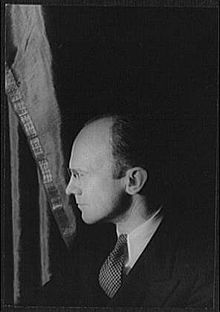- Deems Taylor
-
Joseph Deems Taylor (December 22, 1885 - July 3, 1966) was a U.S. composer, music critic, and promoter of classical music.
Contents
Career
Taylor initially planned to become an architect;[1] however, despite minimal musical training he soon took to music composition. The result was a series of works for orchestra and/or voices. In 1916 he wrote the cantata The Chambered Nautilus, followed by Through the Looking-Glass (for orchestra) in 1918, earning him public praise and recognition.
Taylor was also a friend of the Algonquin Round Table, a group of writers, actors and critics that met almost daily from 1919-1929 at Manhattan's Algonquin Hotel. He briefly dated Dorothy Parker.
In 1921 he secured a job as music critic for the New York World, a post he held when approached by the Metropolitan Opera to suggest a composer to write a new opera. He put forth his own name, and was accepted, the result being The King's Henchman, with the libretto by Edna St. Vincent Millay. Peter Ibbetson followed in 1929.
Taylor was a promoter of classical music throughout his life, working in broadcasting and as intermission commentator for the New York Philharmonic. He appeared in Walt Disney's 1940 film Fantasia as the film's Master of Ceremonies, and was instrumental in selecting the musical pieces that were used in the film, including the then-controversial Sacre du Printemps. He provided the commentary of the technical story behind the recording of actual cannon fire and carillon for the famous recording (by Mercury, in 1954) of Tchaikovsky's 1812 Overture—still one of the most highly regarded recordings of that piece. He was also a frequent guest on the radio quiz program Information Please.
Taylor also served as the president of ASCAP for six years. The ASCAP Deems Taylor Awards were established in 1967 to honor his memory. The Deems Taylor Award "recognizes books, articles, broadcasts and websites on the subject of music selected for their excellence."[2]
His work as a broadcaster, critic, and commentator ultimately overshadowed his work as a composer.[3] In the early 1950s, he was a regular panelist on the NBC game show, Who Said That?, along with H. V. Kaltenborn, Peggy Ann Garner, and Boris Karloff.[citation needed] Taylor’s music is often witty, always deftly formed, well-timed, and entertaining. The basic style of even his later works is academically post-Romantic, resisting any influence of progressive trends except perhaps in orchestration. This conservatism, lacking sharp individual profile or sense of deep conviction, may help to explain the initial enthusiastic acceptance of Taylor’s work (the number of Metropolitan Opera performances for The King’s Henchman and Peter Ibbetson is greater than that of any other American composer, and none of his American-born contemporaries had more large-scale works published), but may also explain the fact that his music was virtually forgotten soon afterward.[4]
Personal life
Taylor was born in New York City to JoJo and Katherine Taylor.[5] He attended New York University (NYU). He married three times. His first wife was Jane Anderson. They married in 1910 and divorced in 1918.[6] In 1921, he married an actress and writer named Mary Kennedy.[7] They had a daughter, Joan Kennedy Taylor, in 1926,[8] and divorced in 1934. Taylor married his third and final wife, costume designer Lucille Watson-Little, in 1945. They divorced eight years later.[9]
Film portrayal
Taylor was portrayed by the actor James LeGros in the 1994 film Mrs. Parker and the Vicious Circle.[10] In the long-unseen roadshow version of Fantasia, issued on DVD in 2000, and re-released on the 2010 Fantasia/Fantasia 2000 Blu-ray release, all of his voice-over work was redubbed by veteran voice artist Corey Burton. (The complete film was originally 124 minutes long, due almost entirely to the fact that Taylor's commentaries were more detailed in the roadshow version, but the original audio elements for these longer commentaries had deteriorated to the point that they could no longer be used, so Corey Burton was selected to re-record all of the dialogue for consistency. The general release version of Fantasia, running 115 minutes, is the version most audiences are familiar with. In that version, Taylor's commentaries were severely abridged.)
Notes
References
- Stevenson, Robert. 2001. "Taylor, (Joseph) Deems". The New Grove Dictionary of Music and Musicians, second edition, edited by Stanley Sadie and John Tyrrell. London: Macmillan Publishers.
- Pegolotti, James A. 2003. Deems Taylor: A Biography, with a foreword by Gerard Schwarz. Boston: Northeastern University Press. ISBN 1-55553-587-9.
Further reading
- Brody, Elaine. 1977. "'The King's Henchman: Fifty Years Later". Notes: Quarterly Journal of the Music Library Association 34, no. 2:319–22.
- Marshall, Jennifer. 1979. "The American Opera Libretto in the 20th Century". Miscellanea Musicologica: Adelaide Studies in Musicology 10:131–57.
- Mehrens, Christopher Emile. 1998. "The Critical and Musical Work of Deems Taylor in Light of Contemporary Cultural Patterns". PhD diss. Chapel Hill: University of North Carolina, Chapel Hill. ISBN 0-591-99576-X.
- Tawa, Nicholas E. 1994. Mainstream Music of Early Twentieth-century America: The Composers, Their Times, and Their Works. Contributions to the Study of Music and Dance 28. Westport, CT: Greenwood. ISBN 0-313-28563-2
External links
Disney's Fantasia Films Conductors Related Segments from Fantasia Toccata and Fugue in D minor · The Nutcracker Suite · The Sorcerer's Apprentice · The Rite of Spring · Symphony No. 6 · Dance of the Hours · Night on Bald Mountain · Ave MariaSegments from Fantasia 2000 Symphony No. 5 · Pines of Rome · Rhapsody in Blue · Piano Concerto No. 2 · The Carnival of the Animals · The Sorcerer's Apprentice · Pomp and Circumstance Marches · The Firebird SuiteCharacters Categories:- 1885 births
- 1966 deaths
- American composers
- Opera composers
- Classical music radio personnel
- Musicians from New York City
- New York University alumni
- New York Herald people
- American music critics
- American composer, 19th century birth stubs
Wikimedia Foundation. 2010.

